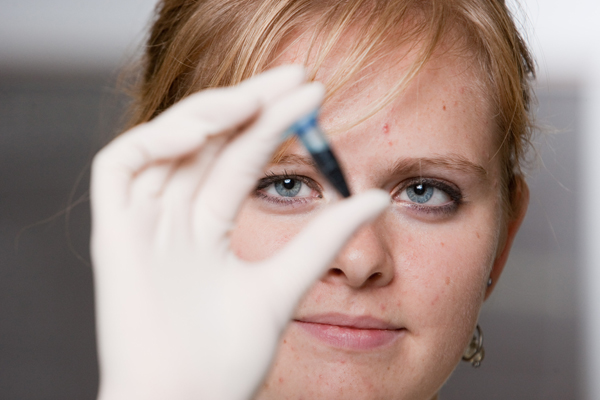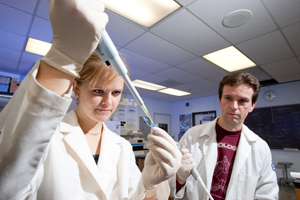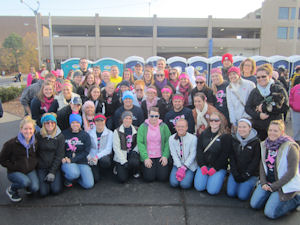How UM-Flint Fights Cancer: From Research to Fundraising

The UM-Flint campus is heavily involved in the fight against cancer. Throughout the year, student organizations participate in efforts like Relay for Life to help raise money. In many cases, UM-Flint undergraduate students also assist faculty who are conducting cancer research.
Here's a quick snapshot of some of the work they're doing:
Associate Professor of Biology Joe Sucic:
"I am examining the regulation of genes that play a critical role in metastasis. My research is examining potential environmental cues that may cause these genes to be switched on, which could offer an explanation as to why cells "decide" to metastasize."

Assistant Professor of Biochemistry Jessica Kelts:
"I am working on discovering how triple negative breast cancer cells metabolize vitamin D and if it's different than the way a "normal" breast cancer cell line does. I am doing this by measuring the amounts of protein in these cells (and the amount of mRNA that codes for these proteins) in both untreated and vitamin D treated cells. Once this project is complete, I'd like to move into trying to discover if vitamin D has a synergistic effect with cancer drugs to kill cancer cells."
Assistant Professor of Physical Therapy Department Min H. Huang:
"I am working with physical therapy students on fall prevention in older cancer survivors. Most cancer incidence and mortality occur in adults 65 years and older, a population that has at least one fall per person each year. Cancer survivors are more likely to fall compared to individuals without cancer because of the disease process and the side effects from the treatment. To this date, few studies have prospectively examined this risk factor profile in the cancer survivors. We are conducting research projects to identify the risk factor profile of falls as well as to develop effective interventions to reduce fall risks in community-living older cancer survivors.
Students working on these projects have presented the preliminary research results at the Annual Meeting of Michigan Physical Therapy Association and the Combined Sections Meeting of American Physical Therapy Association. We plan to continue this line of research in the next few years and expand the scope of research to target specific sub-populations among cancer survivors, such as among individuals with different diagnoses and at various stages of the diseases."
Professor of Physical Therapy Cindy Pfalzer:
Dr. Pfalzer has published 12 peer reviewed research publications and 10 non-peer reviewed publications related to breast cancer, bone marrow transplant cancer rehabilitation, and oncology physical therapy. Much of this research has been funded and conducted at the Rehabilitation Medicine Department at the Clinical Research Center at the National Institutes of Health and at the Breast Care Center at Walter Reed Military Medical Center (formerly the National Naval Medical Center) in Bethesda Maryland with an interprofessional research team including students.
The evidence from Pfalzer's research has led to new models of care for women with breast cancer, where breast cancer has become a chronic disease. The research focuses on screening for and early management of the side effects of medical and surgical cancer treatment which lead to symptoms and physical impairments that limit function. The new model of care is based on prospective surveillance for cancer-related treatment impairments in the federal health system. Several countries with socialized health care systems have adopted this model to reduce the burden of cancer treatment by detecting these physical impairments early, resulting in less severe impairments and functional limitations. The early intervention to reduce or eliminate impairments such as lymphedema, fatigue, and shoulder dysfunction enables these survivors to achieve desired functions. This research has helped improve patients' and health care providers' understanding that rehabilitation can play a role in reducing physical symptoms and impairments, restore function, and decrease the amount of care needed, as well as the cost of care. Pfalzer was also recently appointed editor of Rehabilitation Oncology by the Board of Directors of the Oncology Section of the American Physical Therapy Association.
UM-Flint Student Organizations Rise to the Challenge:
The students of these faculty members, besides assisting with research, are also involved in participating in the Relay for Life. In fact, to be more competitive, three of the science clubs decided to join forces.
The presidents of Molecular Biology Club and the Chemistry Club, decided the clubs would have better luck competing with some larger organizations, such as UM-Flint fraternities and sororities, if they came together. They also invited the Physics Club to join, and created a t-shirt that combines elements of each field of study.

The Physical Therapy department team has participated since 2000. Just last year, they placed in the top ten for fundraising in the Making Strides for Breast Cancer event with just over $5,000.
Related Posts
No related photos.
UM-Flint News
The Office of Marketing & Communications can be reached at [email protected].